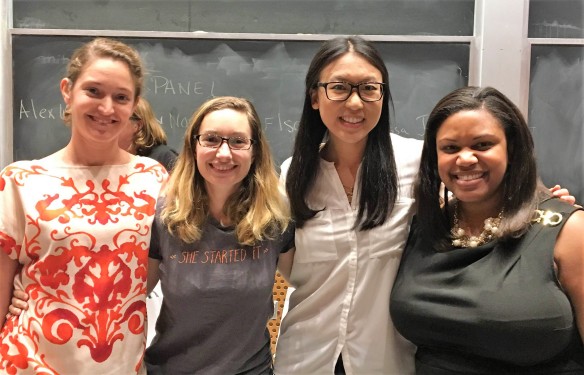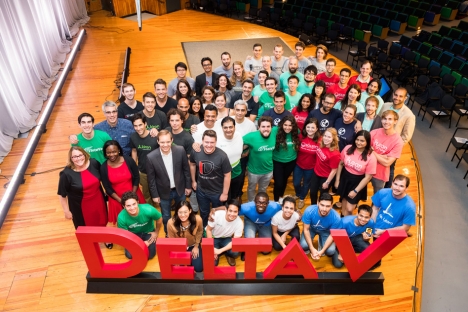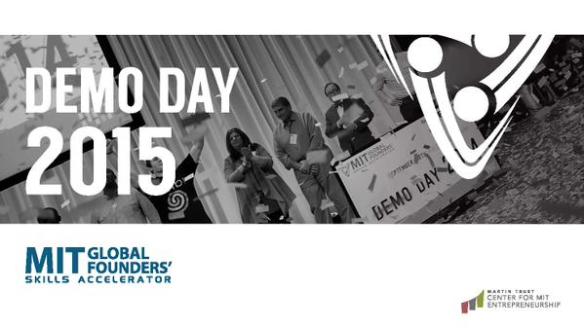 Are you ready to be inspired? MIT’s student venture accelerator, delta v, revealed itself to the world at our 2017 Demo Day on September 9. It was a fantastic culmination to this year’s program and our students are ready change the world with their startup companies.
Are you ready to be inspired? MIT’s student venture accelerator, delta v, revealed itself to the world at our 2017 Demo Day on September 9. It was a fantastic culmination to this year’s program and our students are ready change the world with their startup companies.
I want to thank the students, our speaker Shireen Yates from Nima, the staff at the Martin Trust Center, and our live and online audiences at Demo Day. I invite you to watch the video and view the entire program to see our entrepreneurs pitch their startups.
This year, delta v hosted the largest cohort to date with 21 teams. In addition to bringing a wide range of skill sets to the program, our 2017 cohort was the most diverse in gender and ethnic background, and had a worldwide perspective with representation from many different countries. This had a tremendous benefit in terms of networking and the teams helping each other solve challenges, supporting the philosophy that diversity fuels innovation. The teams took their skills in science, technology, design, management, and entrepreneurship to tackle everything from fresh water scarcity, climate change, and different ways of producing energy to the opioid crisis, soaring healthcare costs and gender inequality in healthcare to global financial transparency – all big problems in need of innovative solutions.
At delta v, our goal isn’t to tell the students how to do things, our goal is to lead them to their own conclusions. We are looking for students with the “heart of an entrepreneur” who are looking to solve the world’s really hard problems. We give them the opportunity to fail and get feedback in a safe environment. Plus, they learn from each other. Our value add is to help guide students who are ready to positively impact the world.
 Here’s a brief overview of each startup that presented at Demo Day (in alphabetical order). Remember them. It’s likely you’ll be able to point back and say, “I saw them when they were just a startup at MIT…”
Here’s a brief overview of each startup that presented at Demo Day (in alphabetical order). Remember them. It’s likely you’ll be able to point back and say, “I saw them when they were just a startup at MIT…”
Focused on empowering women to achieve their goals, Alba is a care giving marketplace for parents in Latin America.
Biobot’s mission is to equip cities with data to build healthier and safer communities. Biobot Analytics’ first application is generating a new type of data on the opioid epidemic. (See recent coverage of the team in Boston Magazine.)
Blockparty tackles food insecurity through fun, engaging cooking classes where young professionals can learn a new recipe while also providing meals to our neighbors in need.
Bloomer Health Tech is transforming heart health and quality of life for women suffering from, or at risk of, heart disease. Bloomer delivers effortless and comfortable medical-grade sensors embedded in a woman’s bra to monitor multiple biomarkers using patent-pending advanced fabrics and algorithms.
Divaqua is committed to making water scarcity yesterday’s problem. They are developing and commercializing higher performing, safer, and more cost-effective technology to treat wastewater.
Power plants, the US’ largest water consumer, use 139 billion gallons of fresh water every day, which amounts to 50% of total US freshwater withdrawals. Infinite Cooling captures water in evaporative cooling tanks and reintroduces it into a powerplant’s cooling cycle.
Klarity’s vision is to provide widespread access to concise and trustworthy legal advice through intelligent technology using machine learning to reduce the time spent on contract review.
Mayflower Venues enables customers to create one-of-a-kind weddings and events while helping preserve unique open spaces across New England.
Mesodyne is bringing portable power to those who need it most. Its breakthrough technology enables ultra-portable, reliable, and affordable energy generation for the military and beyond.
Octant’s data curation platform uses deep learning to accelerate autonomous vehicle (AV) development. Equipped with Octant’s solution, innovators can spend less time collecting and managing data, and more time improving the future of mobility.
Pine Health helps patients follow through on doctor’s orders by using patient data to trigger conversations with an AI-augmented health coach.
ReviveMed is a precision medicine platform that aims to improve people’s health by unlocking the value of metabolomics data, allowing the right therapeutics to be delivered to the right patients.
Roots Studio is a for-profit social enterprise that curates, digitizes, and markets culturally iconic artwork from indigenous and isolated artists to a global marketplace.
Sigma Ratings is the world’s first non-credit risk rating agency and helps companies more effectively and efficiently navigate increasing regulatory challenges.
Sophia connects patients with the right therapists for them using a data-driven matching process, creating stronger therapeutic relationships.
TradeTrack aims to improve personalized customer services in the fashion industry. Their solution increases brand loyalty and helps to improve customer retention.
W8X helps athletes to become their best and strongest selves with strength training equipment that adapts to their specific needs. Inspired by robotics, W8X has developed a weight lifting system that creates resistance electrically.
Waypoint
Waypoint uses augmented reality (AR) to help frontline workers rapidly capture, access, and scale expert knowledge.
The delta v teams also present to alumni and investors in New York City and San Francisco – quite the exciting month!
See more coverage of Demo Day in the MIT News and MIT Sloan Management newsroom.
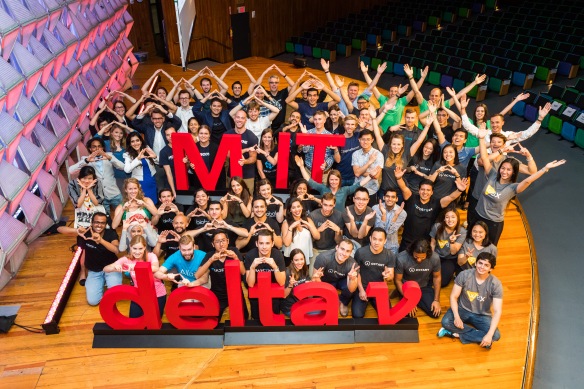

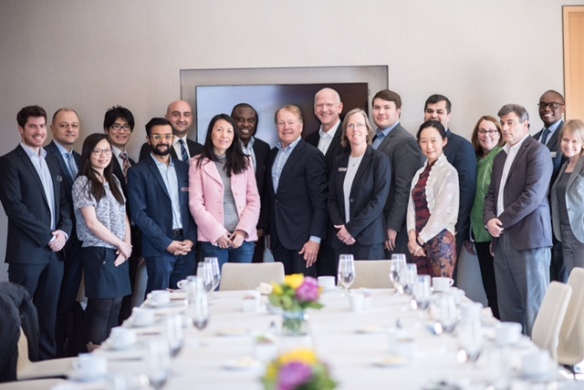


 What does Entrepreneurial Success Look Like?
What does Entrepreneurial Success Look Like?  Here in Massachusetts, we tend to get somewhat of an inferiority complex. Maybe it’s those Puritan roots. We have it stuck in our heads … “Boston’s not as big as NYC” or “We’re not as innovative as Silicon Valley” …
Here in Massachusetts, we tend to get somewhat of an inferiority complex. Maybe it’s those Puritan roots. We have it stuck in our heads … “Boston’s not as big as NYC” or “We’re not as innovative as Silicon Valley” … least
least  realm, Accion is developing revolutionary propulsion for satellites which will make space more accessible and affordable across industries. The company itself is seeing quite a bit of propulsion here in Massachusetts, with funding from the Department of Defense and a Series A round last year, along with numerous awards.
realm, Accion is developing revolutionary propulsion for satellites which will make space more accessible and affordable across industries. The company itself is seeing quite a bit of propulsion here in Massachusetts, with funding from the Department of Defense and a Series A round last year, along with numerous awards. And, here’s something pretty cool that’s happening in innovation right now: is
And, here’s something pretty cool that’s happening in innovation right now: is  tion is using the Microsoft Hololens to enable non-pharmacy hospital staff to fill prescriptions quickly and without errors. The company was invited by AT&T to participate in its inaugural AR/VR Challenge at CES 2017, where it won the $20K grand prize after demoing its prototype to over 250 conference attendees.
tion is using the Microsoft Hololens to enable non-pharmacy hospital staff to fill prescriptions quickly and without errors. The company was invited by AT&T to participate in its inaugural AR/VR Challenge at CES 2017, where it won the $20K grand prize after demoing its prototype to over 250 conference attendees.


